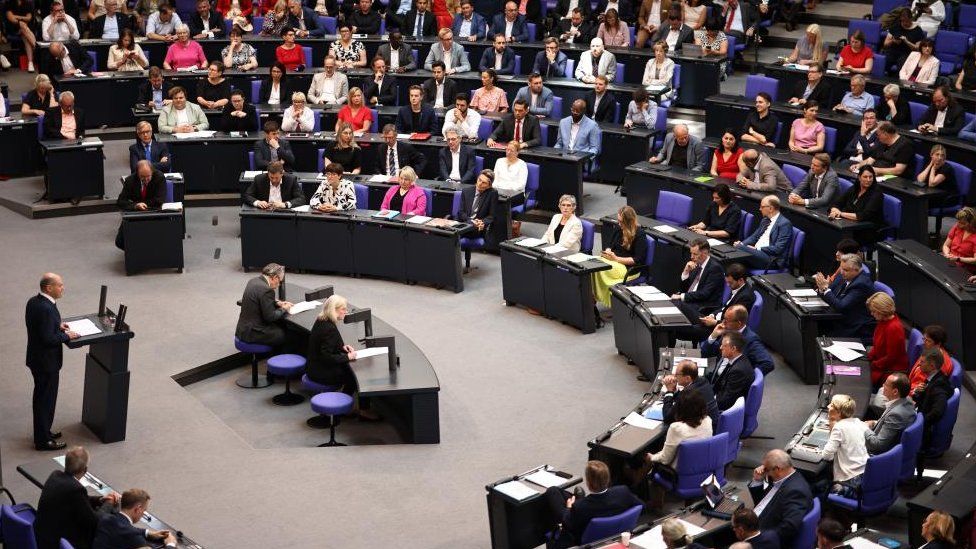While other countries are trying to restrict migration, the German parliament has passed a radical new law to attract migrant workers to Germany.
That means less red tape and lower hurdles for migrant workers from outside the European Union.
A Canada-style points-based system will take into account age, skills, qualifications and any link to Germany.
Criteria will be lowered for salary, educational level and German language ability.
This would make it easier for migrants to come to Germany with, or even without, a job offer. Incentives include being able to bring not only spouse and children, but also parents.
This is a major shift in policy for Germany. For decades German governments have resisted the idea that Germany is a country of migration.
The first generation of so-called "guest workers" from Turkey in the 1960s were seen as exactly that: "guests" who were supposed to help the economy and then leave.
Conservative-led governments in particular, including Angela Merkel's administration, struggled with the idea of a society open to migrant workers - despite the fact German society is increasingly diverse. More than a quarter of the population in Germany is either foreign-born or has at least one foreign-born parent.
After years of low unemployment German business leaders are sounding the alarm about the lack of workers. The problem is exacerbated by an ageing population: baby-boomers born in the 1960s will soon start heading for retirement.
Ministers warn that millions of job vacancies already need filling, and describe the labour shortage as the biggest risk facing the German economy.

When Olaf Scholz's centre-left Social Democrat SPD party beat Mrs Merkel's conservatives in 2021, the new SPD-Green-liberal coalition made easing migration rules one of its flagship policies.
This coalition has been plagued by rows between the Greens and the business-friendly liberals over climate change policies. But both parties do agree on migration: the liberals want workers for the economy; the Greens more human rights in migration policy.
But Friday's parliamentary debate about the law was ferocious. Conservatives voted against the bill, outraged that the new law would allow some rejected asylum seekers already here to find work.
The far-right AfD also voted no, saying that Germany was not a country of "immigration" but rather a "homeland", reflecting the party's increasingly nativist view of what it means to be German.
The AfD does not reflect mainstream society's view that Germany needs migrant workers. But despite this, or maybe because of it, the party is reaching unprecedented numbers in the polls.
In the latest ARD Deutschland Trend, the party reached 19% this week, the highest it has ever scored in this poll. Chancellor Olaf Scholz's SPD party has slumped to 17%.
The political climate in Germany is polarised and febrile when it comes to migration. The government wants it, the economy needs it and parliament has now voted for it. But will all voters accept it?
Latest Stories
-
Woman dies after being set on fire on NYC subway
2 hours -
Elon Musk’s curious fixation with Britain
2 hours -
EBID wins the Africa Sustainability Award
3 hours -
Expansion Drive: Takoradi Technical University increases faculties
8 hours -
SHS heads demand payment of outstanding funds before reopening of schools
8 hours -
We thank God for the 2024 general elections – Akufo-Addo
9 hours -
Coconut Grove Beach Resort marks 30 years of excellence with memorable 9 lessons & carols service
9 hours -
WAFU B U-17 Girls’ Cup: Black Maidens beat Nigeria on penalties to win inaugral tournament
10 hours -
Real Madrid beat Sevilla to keep pressure on leaders Atletico
11 hours -
Liverpool put six past Spurs to go four points clear
11 hours -
Manchester United lose 3-0 at home to Bournemouth yet again
11 hours -
CHAN 2024Q: ‘It’s still an open game’ – Didi on Ghana’s draw with Nigeria
11 hours -
CHAN 2024Q: Ghana’s Black Galaxies held by Nigeria in first-leg tie
12 hours -
Dr Nduom hopeful defunct GN bank will be restored under Mahama administration
12 hours -
Bridget Bonnie celebrates NDC Victory, champions hope for women and youth
12 hours

